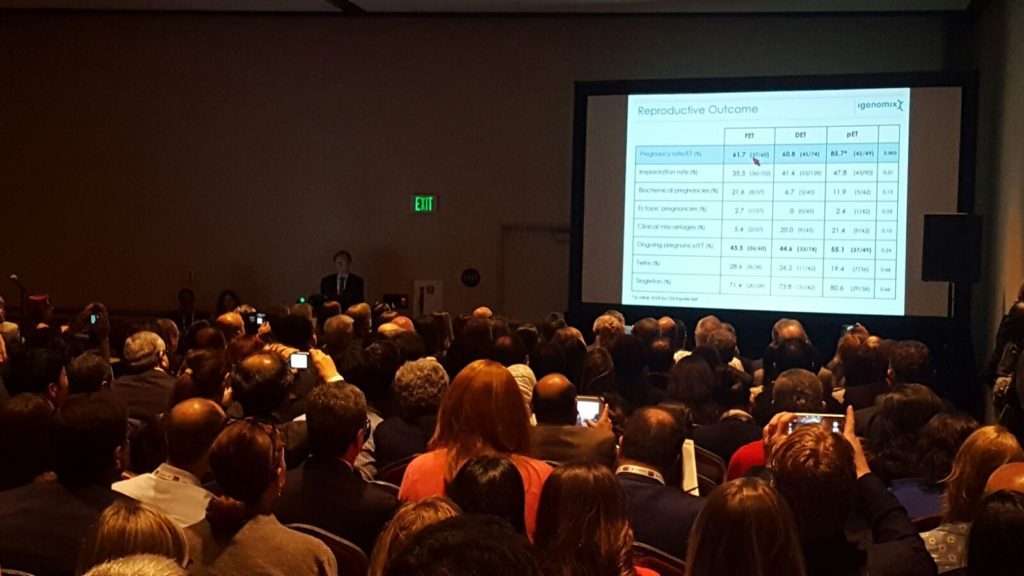At the 72nd AMERICAN SOCIETY FOR REPRODUCTIVE MEDICINE Scientific Congress (ASRM)
THE ERA RECEPTIVITY TEST, DESIGNED BY IGENOMIX, IMPROVES PREGNANCY RATE IN PATIENTS UNDER 38 YEARS OLD BY 24%
- The randomized trial that was conducted on 356 patients from five countries world-wide, substantiates the success of the test.
- The ERA test personalizes treatment and works out the day in which the embryo transfer will be successful for 85% of patients.
- The results verify the benefits of taking the test before commencing reproductive treatment.
- The study has been awarded as Prize Paper by the Society for Reproductive Endocrinology and Infertility, in this year’s ASRM Annual Meeting.
Salt Lake City (UT, USA) 18 October 2016
 Today, in the 72nd ASRM Scientific Congress, which is taking place over the course of several days in Salt Lake City (Utah, USA), Professor Simón, scientific director of Igenomix, presented a prospective and randomized study titled Prospective, randomized study of the endometrial receptivity analysis (ERA) test in the infertility work-up to guide personalized embryo transfer versus fresh transfer or deferred embryo transfer. The study serves as proof that the ERA test, to this date used only on patients encountering difficulties, offers a significant improvement to the overall pregnancy rate, which stands at 85% in personalized transfers according to test results.
Today, in the 72nd ASRM Scientific Congress, which is taking place over the course of several days in Salt Lake City (Utah, USA), Professor Simón, scientific director of Igenomix, presented a prospective and randomized study titled Prospective, randomized study of the endometrial receptivity analysis (ERA) test in the infertility work-up to guide personalized embryo transfer versus fresh transfer or deferred embryo transfer. The study serves as proof that the ERA test, to this date used only on patients encountering difficulties, offers a significant improvement to the overall pregnancy rate, which stands at 85% in personalized transfers according to test results.
Furthermore, it has been selected by the Society for Reproductive Endocrinology and Infertility Prize Paper in this year’s Annual Meeting.
The ERA test (Endometrial Receptivity Analysis) works by analyzing the expression of 238 genes in the endometrium, providing insight into its receptivity or lack thereof when embryo transfer takes place. In recent years, it has enhanced the reproductive prognosis of many patients by offering a personalized window of implantation. This test, patented by Igenomix in 2012, determines the optimal moment for embryo transfer on a case-by-case basis, fully incorporating personalized treatment into the fertility clinic.
“Personalizing the endometrial factor of an infertile couple should be taken into consideration before commencing treatment in order to enhance their chances of reproduction; this is what the study demonstrates. The ERA test can save on time, expensive tests and diagnoses, playing a crucial role in embryo transfer and making sure the embryo is implanted in the specified window of time”, said Professor Simón, following the presentation of the study. In total, 356 patients under 38 years old took part between 2013 and 2016, receiving treatment in fertility clinics located in five different countries (Spain, Bulgaria, Belgium, Panama and Italy).
Research states that endometrial receptivity takes place in a limited window of time, between the 19th and 21st day of the standard menstrual cycle, which is known as the “implantation window”. In a natural cycle, ovulation and endometrial development are in sync so that the implantation window opens at the exact moment when an embryo is ready to be implanted. This window may be shifted in assisted reproduction and it is important to personalize treatment in order to determine the optimal moment.
“The development of new ‘omics’ technology alongside the bioinformatics analysis of data is offering us new insight into endometrial receptivity and its connection to fertility treatments. According to data provided by this study, all women under 38 years old with endometrial factor are eligible to try the ERA test, as their reproductive prognosis can increase by 24% if embryo transfer takes place on the day recommended by the test”, added Professor Simón.
The ERA test is currently the only tool available to evaluate the status of endometrial activity from a molecular point of view. In addition to significantly improving the pregnancy rate, in the last four years it has offered a solution to more than 10,000 patients who struggled to conceive despite regular attempts.



About Igenomix
IGENOMIX is a biotechnology company that provides advanced services in reproductive genetics. Our broad experience and advanced research ability make us one of the global leaders in this field, and we make sure we offer effective solutions adapted to different infertility problems. We have labs in Valencia, Miami, Los Angeles, New York, Mexico City, Sao Paolo, Dubai and Delhi, and work with over 165 qualified professionals worldwide.
Further information about the company at https://www.igenomix.com




